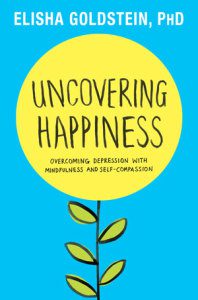My dharma friend and mindfulness colleague, Elisha Goldstein has a fascinating new book out. It describes the ways that we can harness our own healing power to create natural antidepressants. These five include mindfulness, of course, self-compassion, living in accordance with purpose, play, and a sense of mastery.
His book contains practical guidance that can be helpful for just about anyone who ever struggles with depression or self-loathing, which pretty much covers most of us.
Here is the promise of the book:
Mindfulness works by interrupting the conditioned cycle of thoughts, emotions, sensations, and behavior that mire people in a downward spiral of depression. Using mindfulness allows us to transform our harsh internal critics to voices of support by increasing the capacity for self-compassion that nurtures self-worth and resiliency.
This is a very appealing invitation for bringing mindfulness into your life. Mindfulness would also interrupt any downward spiral such as anxiety.
The book is organized into three sections, the first focuses on depression, the second focuses on the five natural antidepressants mentioned above, and the final section is a practical, hands-on resource for making lasting change in your life.
Elisha is not only a pioneer in mindfulness treatment methods, he is a practitioner himself. Without shame, he shares the story of how he came to mindfulness from a very vulnerable position in his life. Mindfulness is not some intellectual curiosity to him, then, it is a living and breathing and life-saving practice.
Mindfulness and self-compassion are part of living an awakened life and dictate, encourage, and support behaviors, attitudes, and insights that can harness our natural healing capacities.
Depression is on the rise in this culture and so is the reliance on anti-depressant medication. He makes an eloquent case that depression is not your fault; however you must take responsibility for it if you want to change.
It might be the case that our culture is increasingly depressed precisely because of the lack of the five natural antidepressants in our lives. We go through our days harried, mindless, and stressed. We beat ourselves up relentlessly. We’ve lost touch with purpose and play. Mastery is not in short supply but it is often done in a task-driven way that squeezes out the joy.
This is a book that I will recommend to my depressed patients and those who are not clinically depressed but are simply too hard on themselves. I have enjoyed reading it myself as a reminder of the things that I know about these practices and I value seeing the novel ways that he packages the practices. It’s safe to say that Dr. Goldstein is the mindfulness therapist’s, mindful therapist.


